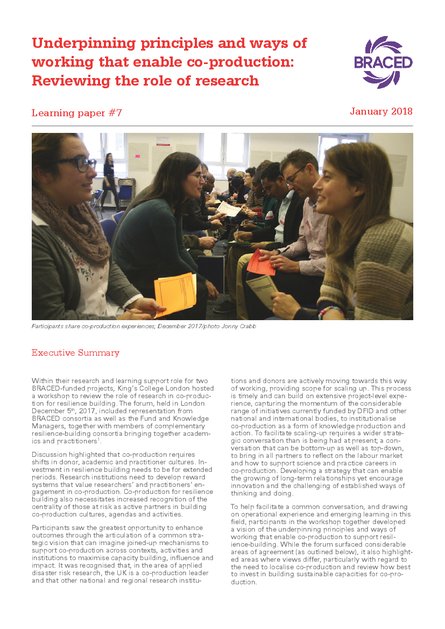
Within their research and learning support role for two BRACED-funded projects, King’s College London hosted a workshop to review the role of research in co-production for resilience building. The forum, held in London December 5th, 2017, included representation from BRACED consortia as well as the Fund and Knowledge Managers, together with members of complementary resilience-building consortia bringing together academics and practitioners.
Discussion highlighted that co-production requires shifts in donor, academic and practitioner cultures. Investment in resilience building needs to be for extended periods. Research institutions need to develop reward systems that value researchers’ and practitioners’ engagement in co-production. Co-production for resilience building also necessitates increased recognition of the centrality of those at risk as active partners in building co-production cultures, agendas and activities.
Participants saw the greatest opportunity to enhance outcomes through the articulation of a common strategic vision that can imagine joined-up mechanisms to support co-production across contexts, activities and institutions to maximise capacity building, influence and impact. It was recognised that, in the area of applied disaster risk research, the UK is a co-production leader and that other national and regional research institutions and donors are actively moving towards this way of working, providing scope for scaling up. This process is timely and can build on extensive project-level experience, capturing the momentum of the considerable range of initiatives currently funded by DFID and other national and international bodies, to institutionalise co-production as a form of knowledge production and action. To facilitate scaling-up requires a wider strategic conversation than is being had at present; a conversation that can be bottom-up as well as top-down, to bring in all partners to reflect on the labour market and how to support science and practice careers in co-production. Developing a strategy that can enable the growing of long-term relationships yet encourage innovation and the challenging of established ways of thinking and doing.
To help facilitate a common conversation, and drawing on operational experience and emerging learning in this field, participants in the workshop together developed a vision of the underpinning principles and ways of working that enable co-production to support resilience-building. While the forum surfaced considerable areas of agreement (as outlined below), it also highlighted areas where views differ, particularly with regard to the need to localise co-production and review how best to invest in building sustainable capacities for co-production.
